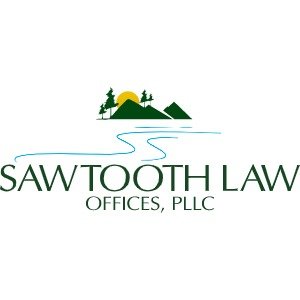Best Bankruptcy Lawyers in Idaho
Share your needs with us, get contacted by law firms.
Free. Takes 2 min.
Or refine your search by selecting a city:
List of the best lawyers in Idaho, United States
About Bankruptcy Law in Idaho, United States
Bankruptcy law is a specialized area of federal and state law designed to help individuals and businesses manage overwhelming debt. In Idaho, bankruptcy filings are governed by federal law, specifically the United States Bankruptcy Code, but certain Idaho exemptions and procedures also play a critical role. The bankruptcy process can provide a fresh financial start by allowing people to discharge certain debts or restructure payments. Common bankruptcy types include Chapter 7, known as liquidation bankruptcy, and Chapter 13, which is a form of reorganization allowing for a repayment plan. Idaho residents considering bankruptcy should understand how both federal and Idaho-specific rules impact their case.
Why You May Need a Lawyer
Filing for bankruptcy is a significant legal and financial decision. Many individuals and small business owners may need legal advice for reasons such as:
- Deciding if bankruptcy is the right financial option
- Understanding the differences and eligibility requirements for Chapter 7 and Chapter 13 bankruptcies
- Navigating the detailed paperwork and strict filing deadlines
- Protecting key assets, such as a home or vehicle, through the proper use of exemptions
- Addressing threats of foreclosure, repossession, or wage garnishment
- Dealing with aggressive creditors or collection lawsuits
- Ensuring all debts eligible for discharge are included
- Interpreting Idaho-specific exemption laws
- Complying with mandatory credit counseling and debtor education requirements
- Representing your interests in bankruptcy court hearings or creditor meetings
Because a mistake in the bankruptcy process can lead to case dismissal or loss of valuable assets, consulting with a qualified bankruptcy attorney in Idaho is often essential.
Local Laws Overview
While bankruptcy cases in Idaho primarily follow federal law, state laws play a crucial role in determining what property you can protect from creditors. Idaho law specifies certain exemptions that allow you to keep property such as your primary residence up to a specific value, personal vehicles, household goods, retirement accounts, and tools of the trade, subject to value limits. Idaho does not allow residents to use federal exemptions, so understanding the list and amounts of Idaho exemptions is vital. The Idaho homestead exemption, for example, offers protection for equity in your primary residence up to a certain dollar amount, which can change periodically. Additionally, bankruptcy cases in Idaho are filed in the United States Bankruptcy Court for the District of Idaho, with locations in Boise, Coeur d'Alene, and Pocatello.
Some other unique aspects of Idaho law that affect bankruptcy include community property rules for married couples, specific timelines for exemption residency requirements, and the presence of local procedural rules issued by the bankruptcy court. Properly applying these local laws can maximize the protection of assets and ensure a smoother bankruptcy process.
Frequently Asked Questions
What types of bankruptcy are most common in Idaho?
Chapter 7 and Chapter 13 are the most common types of bankruptcy for individuals in Idaho. Chapter 7 involves liquidating non-exempt assets to pay creditors and discharges most unsecured debts. Chapter 13 allows for a debt repayment plan over three to five years while keeping most property.
Am I eligible to file for Chapter 7 bankruptcy in Idaho?
Eligibility for Chapter 7 bankruptcy in Idaho depends on passing a means test, which examines your income, family size, and allowable expenses. Generally, if your income is below the Idaho median for your household size, you may qualify.
What property can I keep if I declare bankruptcy in Idaho?
Idaho residents must use state exemptions rather than federal ones. Common exemptions include a portion of home equity (homestead exemption), personal vehicles up to a set value, household furnishings, retirement accounts, and tools used for work. Exemption amounts change, so check the latest figures.
How long does a bankruptcy case take in Idaho?
A typical Chapter 7 bankruptcy case in Idaho takes three to six months from filing to discharge. Chapter 13 cases take three to five years due to the repayment plan. Complexity, court schedules, and paperwork accuracy can affect timelines.
Will bankruptcy stop foreclosure or repossession?
Filing for bankruptcy generally triggers an automatic stay, which temporarily stops foreclosure or repossession efforts. However, long-term protection depends on factors like the type of bankruptcy filed and your ability to keep up with future payments.
Can I eliminate all debts through bankruptcy in Idaho?
Not all debts are dischargeable. Bankruptcy usually discharges unsecured debts like credit card balances and medical bills. However, certain debts, such as student loans, child support, alimony, some taxes, and court fines, typically cannot be discharged.
Will bankruptcy affect my credit score in Idaho?
Yes, filing for bankruptcy will negatively impact your credit score and remain on your credit report for up to 10 years (Chapter 7) or 7 years (Chapter 13). However, it may also provide an opportunity to rebuild your credit after discharge.
What is the cost of filing bankruptcy in Idaho?
Filing fees for bankruptcy cases are determined by the court and change over time. As of 2024, the standard filing fee for Chapter 7 is approximately 338 dollars and for Chapter 13 it is about 313 dollars. Attorney fees are additional and vary by complexity and provider.
Do I have to go to court during my bankruptcy case?
Yes, you must attend at least one proceeding called the 341 meeting of creditors, which is less formal than a court trial. Some cases may require additional hearings before the bankruptcy judge, but most debtors do not need to appear in court unless there are disputes.
Can married couples file for bankruptcy together in Idaho?
Yes, married couples in Idaho can file a joint bankruptcy petition. This can simplify the process and help protect certain community property through state exemptions. A lawyer can help determine whether a joint or individual filing is best.
Additional Resources
If you are considering bankruptcy in Idaho, the following resources can provide information and support:
- United States Bankruptcy Court for the District of Idaho - Provides forms, court locations, and procedural guides
- Idaho Legal Aid Services - Offers legal information and possible free or low-cost legal assistance for qualifying individuals
- Idaho State Bar Lawyer Referral Service - Connects individuals with licensed bankruptcy attorneys
- Credit counseling agencies approved by the United States Trustee Program - Required for most bankruptcy filers
- Consumer Financial Protection Bureau - Offers educational materials about managing debt and bankruptcy
- Local public libraries - Often have legal information guides and reference materials for Idaho residents
Next Steps
If you are struggling with debt and considering bankruptcy in Idaho, here are steps you can take:
- Evaluate your financial situation and gather information about your debts, assets, income, and expenses.
- Consult with a qualified bankruptcy attorney licensed in Idaho to discuss your options and determine your eligibility.
- Attend an approved credit counseling session, which is required before filing for bankruptcy.
- Work with your attorney to complete and file all necessary bankruptcy forms with the United States Bankruptcy Court for the District of Idaho.
- Attend the 341 meeting of creditors and any other required court proceedings.
- Complete a debtor education course before receiving your discharge.
- Stay informed of your rights and responsibilities throughout the process, and seek professional advice if you encounter difficulties.
Filing for bankruptcy is a major decision, but it can offer a path to financial recovery and relief from creditor actions. Take the time to learn about your options, seek reputable legal help, and follow proper procedures to protect your interests in Idaho.
Lawzana helps you find the best lawyers and law firms in Idaho through a curated and pre-screened list of qualified legal professionals. Our platform offers rankings and detailed profiles of attorneys and law firms, allowing you to compare based on practice areas, including Bankruptcy, experience, and client feedback.
Each profile includes a description of the firm's areas of practice, client reviews, team members and partners, year of establishment, spoken languages, office locations, contact information, social media presence, and any published articles or resources. Most firms on our platform speak English and are experienced in both local and international legal matters.
Get a quote from top-rated law firms in Idaho, United States — quickly, securely, and without unnecessary hassle.
Disclaimer:
The information provided on this page is for general informational purposes only and does not constitute legal advice. While we strive to ensure the accuracy and relevance of the content, legal information may change over time, and interpretations of the law can vary. You should always consult with a qualified legal professional for advice specific to your situation.
We disclaim all liability for actions taken or not taken based on the content of this page. If you believe any information is incorrect or outdated, please contact us, and we will review and update it where appropriate.
Browse bankruptcy law firms by city in Idaho
Refine your search by selecting a city.











